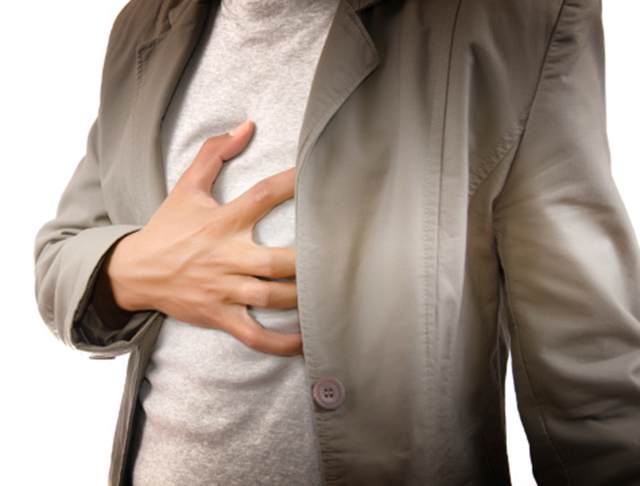Filtered By: Lifestyle
Lifestyle
What is heartburn, really?
by IME MORALES
 There is no Tagalog translation for the word heartburn. Yet it is so prevalent that it affects millions of people worldwide. “In Asia, it is also a growing problem. In the last two decades, incidence has doubled," says Dr. Melchor Chan, professor at the UST Department of Medicine and chief of the Endoscopy Unit at the UST Hospital.
There is no Tagalog translation for the word heartburn. Yet it is so prevalent that it affects millions of people worldwide. “In Asia, it is also a growing problem. In the last two decades, incidence has doubled," says Dr. Melchor Chan, professor at the UST Department of Medicine and chief of the Endoscopy Unit at the UST Hospital. More than half, or 60 percent, of heartburn sufferers report that it disrupts their lives. Sixty-one percent say that they experience breakthrough symptoms at night. Breakthrough symptoms are those that manifest despite treatment.
So how would you describe the sensation of heartburn, despite the failure of local linguists to attach an exact local term to this very common condition?
Well, you could say that heartburn is the feeling of heat in the chest area, sometimes extending up to the throat or even the face. Sometimes this feeling would wake you up at night and lead you to fear that you’re having a heart attack. It is not kabag nor impatso, but probably a little close to sinisikmura. But still, it is not quite that.
Heartburn is the hallmark symptom of GERD
Heartburn is caused by the reflux of acid from the stomach back to the esophagus. Dr. Chan says, however, that occasional reflux is a natural process. “It is when reflux becomes persistent and troublesome that (GERD may be present).” GERD stands for gastroesophageal reflux disease.
When the ring of muscle that connects the esophagus and stomach is not working properly, or not closing properly, there is a chance that acid from the stomach will go back up to the esophagus. This acid reflux causes the heartburn, and it could be a sign of GERD if it happens often enough.
Dr. Joseph Bocobo, president of the Philippine Society of Gastroenterology, identified acid regurgitation and heartburn as the two major signs of GERD. Other symptoms to be considered are: non-cardiac chest pain, hoarseness, sensation of lump in the throat, chronic cough or persistent dry cough, and difficulty swallowing. The last one could be a warning symptom of a complicated reflux.
Complications and diagnosis
GERD, if left untreated, could lead to erosive esophagitis. Dr. Chan explains: “Because of constant irritation, the patient develops tears in the esophagus.”
A more serious complication is Barrett’s Esophagus, characterized by raw areas in the esophagus, deeper wounds that sometimes bleed easily. This condition is a prelude to tumors, or esophageal cancer. “The incidence of cancer has increased by 70 to 80 per cent worldwide,” says Dr. Chan. “And there is a strong association between the incidence of GERD and esophageal carcinoma.”
Diagnosis is usually symptom-based. Prolonged presence of GERD or heartburn may merit a procedure called endoscopy or gastroscopy wherein a thin, flexible tube is inserted into the mouth down to the esophagus to see the inner lining. Dr. Bocobo says that this is done if the doctor wants to “find out if there is erosion or inflammation.”
Other less common procedures involve testing acid reflux and measuring the movement and pressure in the esophagus through a diagnostic process called manometry.
Practical solutions and a new drug for heartburn
Heartburn sufferers can take these steps to alleviate their discomfort, says Dr. Bocobo:
- Since people who are obese are more prone to reflux, keep weight at an ideal range.
- Raise the head of bed by 30 to 45 degrees, especially if you suffer from nighttime symptoms.
- Avoid food and drinks that could worsen symptoms: fatty or fried food, spicy food, chocolates, tomato-based dishes, citrus fruits, caffeine, garlic and onions.
- Quit smoking, and avoid alcohol intake.
- Don’t lie down immediately after eating, especially after a heavy meal.
- Don’t wear tight-fitting clothes because these increase abdominal pressure and promote reflux.
- Talk to your physician to determine the best treatment for your condition. Doctors usually prescribe antacids, H2 blockers or PPIs (proton pump inhibitors) to address heartburn related to GERD.
A new PPI, Dexlansoprazole, was recently released by Takeda Pharmaceuticals to treat GERD/heartburn. This particular drug is innovative because it provides 24-hour acid control through Dual Delayed Release technology.
“Basically, there are two medicines in one capsule,” explains Dr. Chan. “The first granule is released two hours after you take it, the other one is released several hours later.” —KG, GMA News
More Videos
Most Popular



